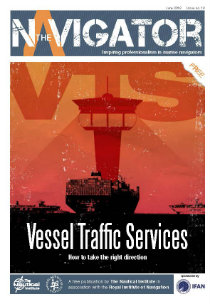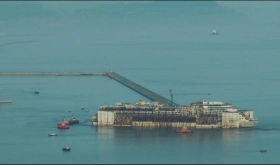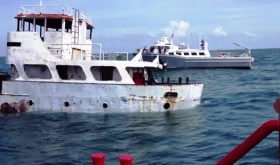During the 3rd annual SAFETY4SEA forum held in Athens in October 2012, George A.Gaitas, Attorney at Law in Houston Texas Chalos & Co. gave a very interesting speech on how a shipping company may get caught in a whistleblower situation and end up paying heavy fines and/or other penalties without ever committing an actual oil pollution. More than a decade has passed since the United States Department of Justice launched a vigorous campaign to enforce the observance of MARPOL 73/78 Annex I regulations by foreign ships calling at U.S. ports. Some ten years later, one would think that ship owners and ship managers would have caught-on, and found ways to effectively deal with it. Unfortunately it hasn’t worked out that way.
Very large monetary incentives in the form of whistleblower cash rewards authorized by the Act to Prevent Pollution from Ships, has created a state of affairs that rewards seafarers for violating MARPOL. These, so-called, “whistleblowers”:
- commit the violations
- report the violations to the U.S. Port State Control authorities
- provide the evidence needed to obtain a conviction or guilty plea on the owner’s and/or manager’s part
- are awarded as much as 50% of the fines assessed
MARPOL is an International convention without self enforcing provisions. It doesn’t contain rules about what happens if you violate it. Each country is left to make its own enforcement rules. There are two countries that have jurisdiction to enforce MARPOL for any given ship: the flag country; and the port state control country. Here we are talking about the USA as a port state control country.
In the United States MARPOL is adopted by a piece of legislation called the Act to Prevent Pollution from Ships, known by its acronym APPS. It is at 33 U.S.C.§ 1901 et seq. MARPOL I requires all events of transfer of oily waste and oil to be recorded in the ship’s oil record book. Some countries enforce MARPOL with administrative sanctions. Not so with the U.S.A. The U.S.A. treats MARPOL violations as criminal offenses, though it also has an option for administrative enforcement which may include civil penalties or even the out and out banning of ships from calling at American ports.
APPS has grafted its own enforcement provisions onto MARPOL and these provide criminal sanctions against those who violate the Convention. In particular 33 USC§ 1908 (a) provides that each violation of MARPOL is regarded as a class D felony. This will get you 5 to 10 years in prison and /or a fine of $ 500,000 if you are an organization, for each violation. And this is not all.
Smart lawyers a few years back thought that since MARPOL prohibits dumping oily waste in the Oceans, and the Oceans are not owned by any country, the U.S. authorities had no jurisdiction to criminally prosecute MARPOL violations. The argument was that the writ of the United States does not run outside its territorial jurisdiction. They raised the argument with a federal trial judge in Texas and won. But then the government appealed and the matter went before the 5th Circuit Court of Appeal which held that the crime prosecuted is not the illegal dumping in the ocean. It is writing of lies about it in the oil record book, and possessing it onboard the vessel while in the U.S.A. U.S. v. Jho, 534 F 3d 398 (5th Cir, 2008).
Remember, so long as you write the truth in the oil record book the government cannot prosecute you. So if your chief engineer writes “today we dumped 10 tons of sludge in the Atlantic Ocean”, You cannot be prosecuted, nor can he.
So the odd thing about APPS prosecutions is that they are not about pollution they are about keeping false records. The Government uses two additional provisions of the criminal law to make things even harder for the owner being prosecuted. On top of the APPS charge it piles up other similar charges relating to the same conduct: i.e. based on the statute that punishes making false statements to the government e.g. the handing over to the USCG of a book with inaccurate entries, 18 U.S. C.§ 1001(False Statements Act); and instructing others to tell false stories to the investigating authorities (Obstruction of Justice Act) 18 U.S.C. §1505). So e.g. if the Coast Guard decides that the ORB contains one false entry, and the chief engineer tells the oiler to state that this is a correct entry, you are looking at three different class D felonies.
The prosecution of Owners for MARPOL violations in the last 12 months or so has been ever strong and ever vigorous. The department of Justice has a special section known as the Environmental Crimes Division. It is run by people who have a lifetime dedication and missionary zeal when it comes to prosecuting shipowners. They are what one might call crusaders.
Targeted ships are not just substandard elderly tonnage, rapidly becoming extinct anyway. Rather, the ships targeted are young; state of the art; well managed; with well organized quality and safety departments; sophisticated crew training programs; strict procedures for pollution prevention, etc.
But none of this helps the owner. The government doesn’t care whether you have a world class operation. They will disregard all the sophisticated systems and will take the word of the oiler or wiper who produces an oil stained hose with flanges, over the owner’s word.
The impression we have from our recent work is that owners are being set up by greedy seamen; well practiced and prepared to play the role of whistleblower; motivated by an eventually large reward they anticipate to collect ( 50% of the fine at the court’s discretion). They have the U.S. Government on their side. Whom do owners have?
There is no doubt. We are seeing a magic pipe industry out there operating for profit. Whistleblowers appear to have well qualified legal advocates (for a share of the money), and connections with certain international union representatives.
So, having chosen to employ seafarers from countries that are training grounds for whistleblowers i.e. people who will deliberately discharge oil overboard in order to blame the vessel owner and collect a large reward, is there anything you can do as an owner or manager of the ship to prevent it?
As things stand now American law rewards people who are polluters and liars – this is what whistle blowers often are – and this will always be and we cannot change that, and it is unfair.
Suppose tomorrow when your ship come into Houston or New Orleans the Coast Guard comes onboard and wants to do an extended MARPOL inspection, Do you know how to respond? Have you prepared your chief engineer and master how to respond?
There is plenty you can do to prepare for such an encounter but the work needs to be done well in advance. If it has been done, I feel the chances of being caught in a whistleblower situation involving APPS are minimal.
Prevention of getting caught to a whistleblower sitaution may include the following
- Put in place a whistleblower prevention program
- Regularly have officers you trust check oily waste management systems for compromised points i.e. pipes, flanges, pumps, unlawful installations, excessive ware around flanges, oil spots, etc.
- Whistleblower- proof your oily waste management network, e.g. use seals.
- Hold accountable, supervise close, deter and sanction. Fire some people. Practice zero tolerance don’t just talk about it in the ships policies and SMS.
- Keep permanent records of oily waste management (sounding log, oily water separator log, incinerator log). Regularly check and hold accountable those who maintain them.
- Control the supply of flexible hose and flanges and any other materials that can be used to compromise the integrity of the engineroom oily waste management system.
- Have shoreside management regularly review Oil Record Book entries for compliance with MARPOL regulations and accuracy.
- Use Superintendent visits as actual audit events to ensure observance of these procedures,
- Maintain ship – office extensive correspondence on the subject of these inspections.
- Don’t recruit from whistleblower mills. Ask around which crewing agents supply whistleblowers.
- Have a retired U.S. Coast Guard man come onboard and show you what you should expect and be prepared.
- Please note, when the authorities enforcing APPS catch up with one ship, they want to bring in a whole fleet. They score their points on how big of a company they can bring down. They brag on how they forced vessel’s managers to enter into pleas of guilty and submit their managed ships into wholesale compliance plans.
- Don’t use the word “operator” when you describe the office that manages the ship. “Operator” has a very specific legal meaning in APPS. ” 33 USC § 1901, definition: “operator” means – (a) in the case of a ship, a charterer by demise or any other person, except the owner, who is responsible for the operation, manning, victualing, and supplying of the vessel,” Operators can be held liable under APPS. So, it makes no sense to volunteer that the fleet management company is the operator.
- Your paperwork should also avoid giving the impression that there is an operator involved. Care should be taken not to identify an “operator” in office forms found onboard the ship. It should be made clear to officers, port agents, et al. that the office is not “the operator”.
- Remember to use “as agents only” in all correspondence, even in correspondence that goes out to the ship. Ideally, each ship-owning company should hold its own document of compliance and be the operator of the vessel as well.
- Remember your corporate structure is something entirely under your control and there is a lot that can be done ahead of time to avoid entangling a whole fleet in the APPS whistleblower trap.
Source: SAFETY4SEA














Well, this seems to answer the question I posed in the article on a recent prosecution: “Where is the financial motive for crew violations?”
It seems from this it is the EPA or US Coastguard itself. One of those unintended consequences.
But as with my original question, what does this mean for fuel sulphur enforcement?
No doubt the US will apply the same policy and the EU certainly wants to introduce (if it hasn’t already) a whistle blower policy and it wants to treat all pollution violations as criminal offences whether deliberate or accidental.